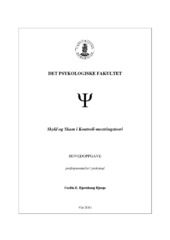| dc.contributor.author | Bjørge, Cecilia Emilia Bjørnhaug | |
| dc.date.accessioned | 2010-09-08T08:38:42Z | |
| dc.date.available | 2010-09-08T08:38:42Z | |
| dc.date.issued | 2010-04-15 | eng |
| dc.date.submitted | 2010-04-15 | eng |
| dc.identifier.uri | https://hdl.handle.net/1956/4111 | |
| dc.description.abstract | The concept of unconscious guilt is central in the understanding of development and maintenance of psychopathology according to Control-Mastery theory. Both guilt and shame are intense and unpleasant and everyone has experiences that involves these feelings. First when these emotions limits the patients daily life we may speak of psychopathology. Guilt and shame can be difficult to separate, both as concepts and as phenomena for those who experience them or try to measure them. Theorists such as Lewis M (1992) and Tangney and Dearing (2002) have pointed out that a missing distinction between the two phenomena cause difficulties in research and also in clinical practice. This thesis focuses on how Control-mastery-theory meets the issue of problems concerning a distinction between guilt and shame. How does Control-mastery theory distinguish these emotions? This theses points to some vague descriptions in the theory’s statement and distinction concerning guilt and shame. The thesis discuss what implications this has for the theory. It is proposed that a grater emphasis on the shame-aspect in the psychological illness will give more depth to the therapists understanding of the patients’ problems and do the therapy more effective. | en_US |
| dc.description.abstract | Begrepet ubevisst skyld står sentralt i forståelsen av utvikling og opprettholdelse av psykopatologi innenfor kontroll-mestringsteori. Skyld- og skamfølelser er intense og ubehagelige emosjoner alle mennesker har erfaringer med. Først når disse emosjonene begrenser pasientens livskvalitet kan det omtales som psykopatologi. Skyld og skam kan være vanskelige å skille fra hverandre, både som begreper og som fysiske fenomener for de som opplever dem eller skal registrere og måle dem. Emosjonsteoretikere som for eksempel Lewis (1992) og Tangney og Dearing (2002) har påpekt at et manglende skille mellom begrepene har problematiske følger både for forskning og klinisk praksis. I oppgaven rettes det fokus på hvordan kontroll-mestringsteori møter denne problemstillingen. Hvordan skiller kontroll-mestringsteori mellom skyld og skam? Oppgaven påpeker enkelte uklarheter i kontroll-mestringsteoris fremstilling og distinksjon mellom disse emosjonene. Oppgaven ønsker å diskutere hvilke eventuelle følger dette har for teorien. Det hevdes i oppgaven at en større vektlegging av skamaspektet ved den psykiske lidelsen vil kunne gi terapeuten en bredere forståelse for pasientens problemer, og gjøre terapien mer effektiv. | en_US |
| dc.format.extent | 175415 bytes | eng |
| dc.format.mimetype | application/pdf | eng |
| dc.language.iso | nob | eng |
| dc.publisher | The University of Bergen | eng |
| dc.subject | Skyld | nob |
| dc.subject | Skam | nob |
| dc.subject | Kontroll-mestringsteori | nob |
| dc.subject | Psykologi | nob |
| dc.title | Skyld og skam i kontroll-mestringsteori | nob |
| dc.type | Master thesis | |
| dc.rights.holder | Copyright the author. All rights reserved | |
| dc.rights.holder | The author | eng |
| dc.description.localcode | PSYK300 | |
| dc.description.localcode | PRPSYK | |
| dc.subject.nus | 736102 | eng |
| dc.subject.nsi | VDP::Samfunnsvitenskap: 200::Psykologi: 260 | nob |
| fs.subjectcode | PSYK300 | |
